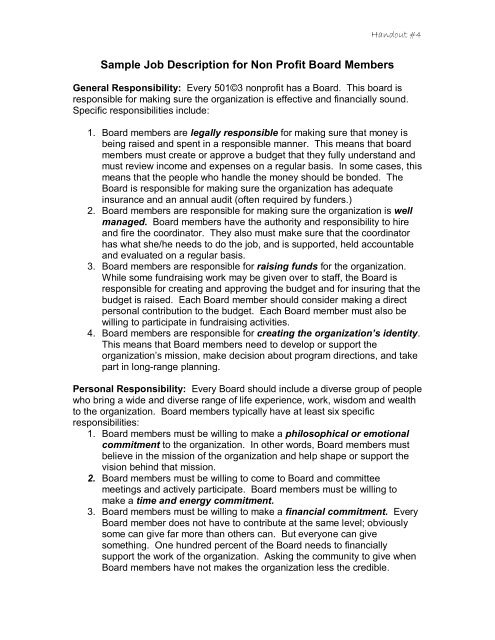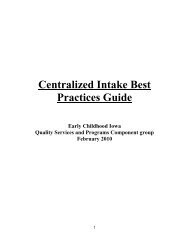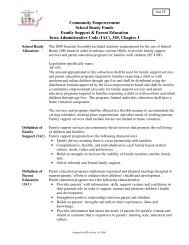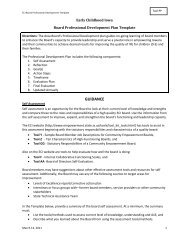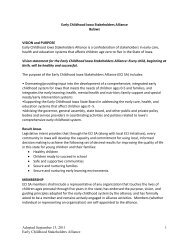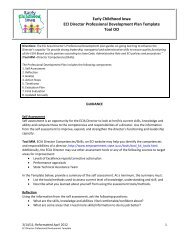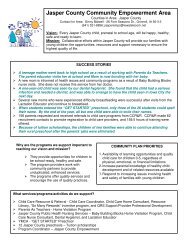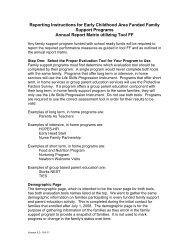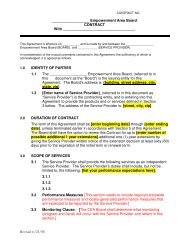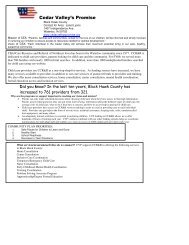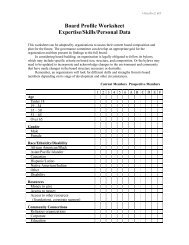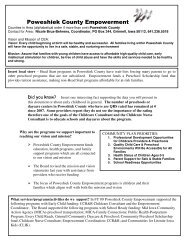Sample Job Description for Non Profit Board Members - Early ...
Sample Job Description for Non Profit Board Members - Early ...
Sample Job Description for Non Profit Board Members - Early ...
You also want an ePaper? Increase the reach of your titles
YUMPU automatically turns print PDFs into web optimized ePapers that Google loves.
Handout #4<br />
<strong>Sample</strong> <strong>Job</strong> <strong>Description</strong> <strong>for</strong> <strong>Non</strong> <strong>Profit</strong> <strong>Board</strong> <strong>Members</strong><br />
General Responsibility: Every 501©3 nonprofit has a <strong>Board</strong>. This board is<br />
responsible <strong>for</strong> making sure the organization is effective and financially sound.<br />
Specific responsibilities include:<br />
1. <strong>Board</strong> members are legally responsible <strong>for</strong> making sure that money is<br />
being raised and spent in a responsible manner. This means that board<br />
members must create or approve a budget that they fully understand and<br />
must review income and expenses on a regular basis. In some cases, this<br />
means that the people who handle the money should be bonded. The<br />
<strong>Board</strong> is responsible <strong>for</strong> making sure the organization has adequate<br />
insurance and an annual audit (often required by funders.)<br />
2. <strong>Board</strong> members are responsible <strong>for</strong> making sure the organization is well<br />
managed. <strong>Board</strong> members have the authority and responsibility to hire<br />
and fire the coordinator. They also must make sure that the coordinator<br />
has what she/he needs to do the job, and is supported, held accountable<br />
and evaluated on a regular basis.<br />
3. <strong>Board</strong> members are responsible <strong>for</strong> raising funds <strong>for</strong> the organization.<br />
While some fundraising work may be given over to staff, the <strong>Board</strong> is<br />
responsible <strong>for</strong> creating and approving the budget and <strong>for</strong> insuring that the<br />
budget is raised. Each <strong>Board</strong> member should consider making a direct<br />
personal contribution to the budget. Each <strong>Board</strong> member must also be<br />
willing to participate in fundraising activities.<br />
4. <strong>Board</strong> members are responsible <strong>for</strong> creating the organizations identity.<br />
This means that <strong>Board</strong> members need to develop or support the<br />
organizations mission, make decision about program directions, and take<br />
part in long-range planning.<br />
Personal Responsibility: Every <strong>Board</strong> should include a diverse group of people<br />
who bring a wide and diverse range of life experience, work, wisdom and wealth<br />
to the organization. <strong>Board</strong> members typically have at least six specific<br />
responsibilities:<br />
1. <strong>Board</strong> members must be willing to make a philosophical or emotional<br />
commitment to the organization. In other words, <strong>Board</strong> members must<br />
believe in the mission of the organization and help shape or support the<br />
vision behind that mission.<br />
2. <strong>Board</strong> members must be willing to come to <strong>Board</strong> and committee<br />
meetings and actively participate. <strong>Board</strong> members must be willing to<br />
make a time and energy commitment.<br />
3. <strong>Board</strong> members must be willing to make a financial commitment. Every<br />
<strong>Board</strong> member does not have to contribute at the same level; obviously<br />
some can give far more than others can. But everyone can give<br />
something. One hundred percent of the <strong>Board</strong> needs to financially<br />
support the work of the organization. Asking the community to give when<br />
<strong>Board</strong> members have not makes the organization less the credible.
Handout #4<br />
4. <strong>Board</strong> members should bring some special talent, skill, knowledge,<br />
contact or other contribution to the work of the board. This can include<br />
experience in the community being served, extensive board experience,<br />
energy and enthusiasm <strong>for</strong> the work of the organization, willingness to<br />
learn board skills, or technical skills such as legal or public relations knowhow.<br />
5. <strong>Board</strong> members should bring themselves to the work of the <strong>Board</strong>. They<br />
must have a desire to serve and be willing to share their ideas,<br />
experiences, feelings, insights, fears, questions, etc. They must be willing<br />
to read the organizations materials, ask questions, think things<br />
through, make suggestions, and express honest feelings.<br />
6. <strong>Board</strong> members must see themselves as facilitators <strong>for</strong> the<br />
organization, providing support to staff and other <strong>Board</strong> members. They<br />
must be open to working with other people, respecting new ideas, and<br />
taking reasonable risks.<br />
Don Wells<br />
Adapted from the Smart Start Conference, 2002, workshop, Governance vs. Management <br />
<strong>Board</strong> Resource


